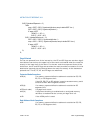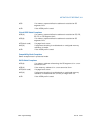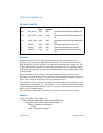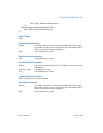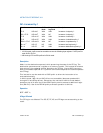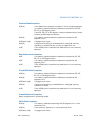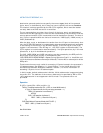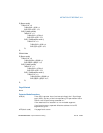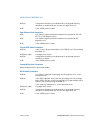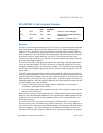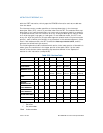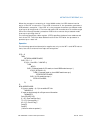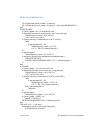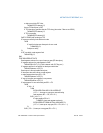
3-468 Vol. 2A INS/INSB/INSW/INSD—Input from Port to String
INSTRUCTION SET REFERENCE, A-M
destination operand symbol must specify the correct type (size) of the operand
(byte, word, or doubleword), but it does not have to specify the correct location.
The location is always specified by the ES:(E)DI registers, which must be loaded
correctly before the INS instruction is executed.
The no-operands form provides “short forms” of the byte, word, and doubleword
versions of the INS instructions. Here also DX is assumed by the processor to be the
source operand and ES:(E)DI is assumed to be the destination operand. The size of
the I/O port is specified with the choice of mnemonic: INSB (byte), INSW (word), or
INSD (doubleword).
After the byte, word, or doubleword is transfer from the I/O port to the memory loca-
tion, the DI/EDI/RDI register is incremented or decremented automatically according
to the setting of the DF flag in the EFLAGS register. (If the DF flag is 0, the (E)DI
register is incremented; if the DF flag is 1, the (E)DI register is decremented.) The
(E)DI register is incremented or decremented by 1 for byte operations, by 2 for word
operations, or by 4 for doubleword operations.
The INS, INSB, INSW, and INSD instructions can be preceded by the REP prefix for
block input of ECX bytes, words, or doublewords. See
“REP/REPE/REPZ/REPNE/REPNZ—Repeat String Operation Prefix” in Intel® 64 and
IA-32 Architectures Software Developer’s Manual, Volume 2B, for a description of the
REP prefix.
These instructions are only useful for accessing I/O ports located in the processor’s
I/O address space. See Chapter 13, “Input/Output,” in the Intel® 64 and IA-32
Architectures Software Developer’s Manual, Volume 1, for more information on
accessing I/O ports in the I/O address space.
In 64-bit mode, default address size is 64 bits, 32 bit address size is supported using
the prefix 67H. The address of the memory destination is specified by RDI or EDI.
16-bit address size is not supported in 64-bit mode. The operand size is not
promoted.
Operation
IF ((PE = 1) and ((CPL > IOPL) or (VM = 1)))
THEN (* Protected mode with CPL
> IOPL or virtual-8086 mode *)
IF (Any I/O Permission Bit for I/O port being accessed
= 1)
THEN (* I/O operation is not allowed *)
#GP(0);
ELSE (* I/O operation is allowed *)
DEST ← SRC; (* Read from I/O port *)
FI;
ELSE (Real Mode or Protected Mode with CPL IOPL *)
DEST ← SRC; (* Read from I/O port *)
FI;
Non-64-bit Mode:



